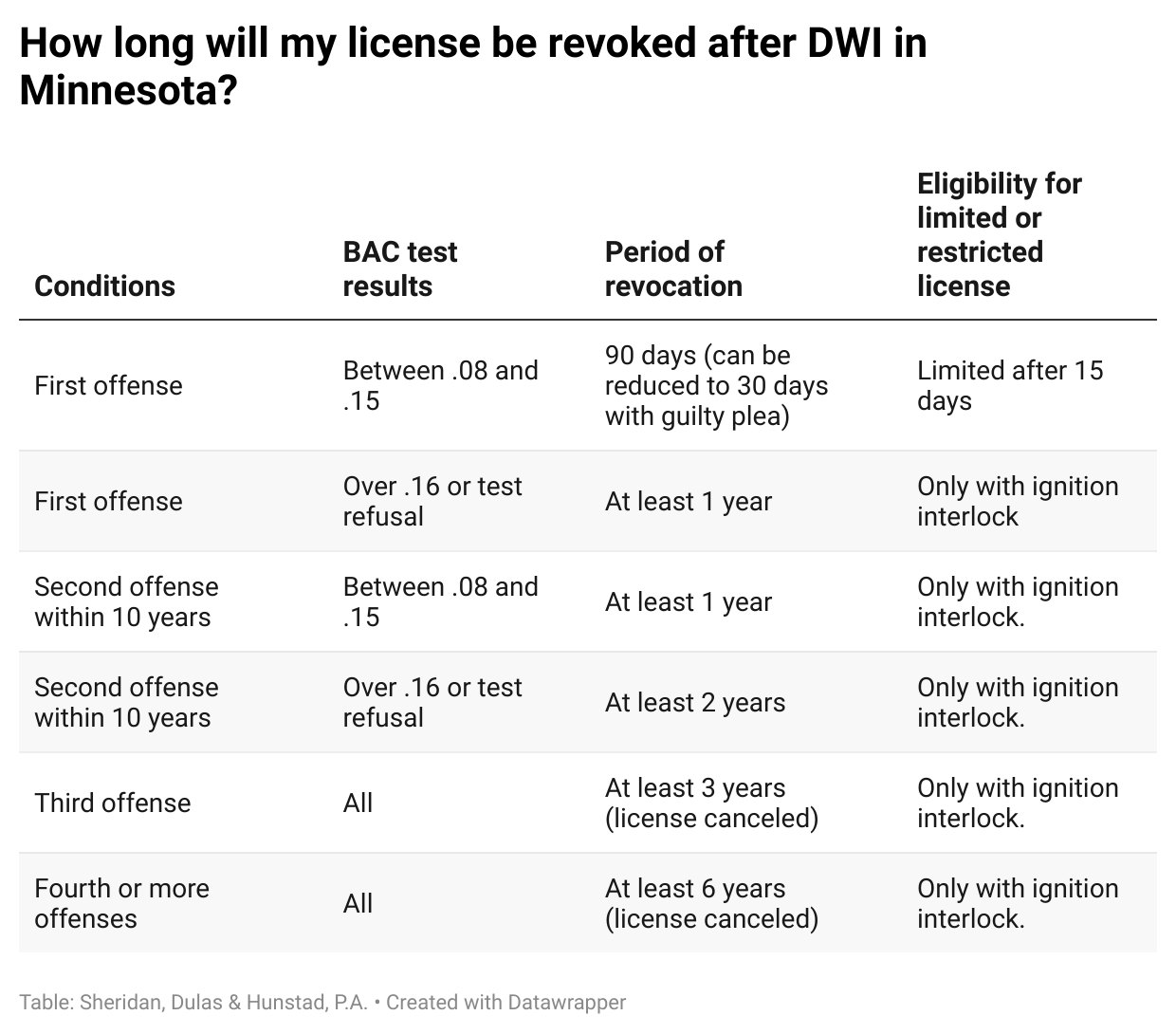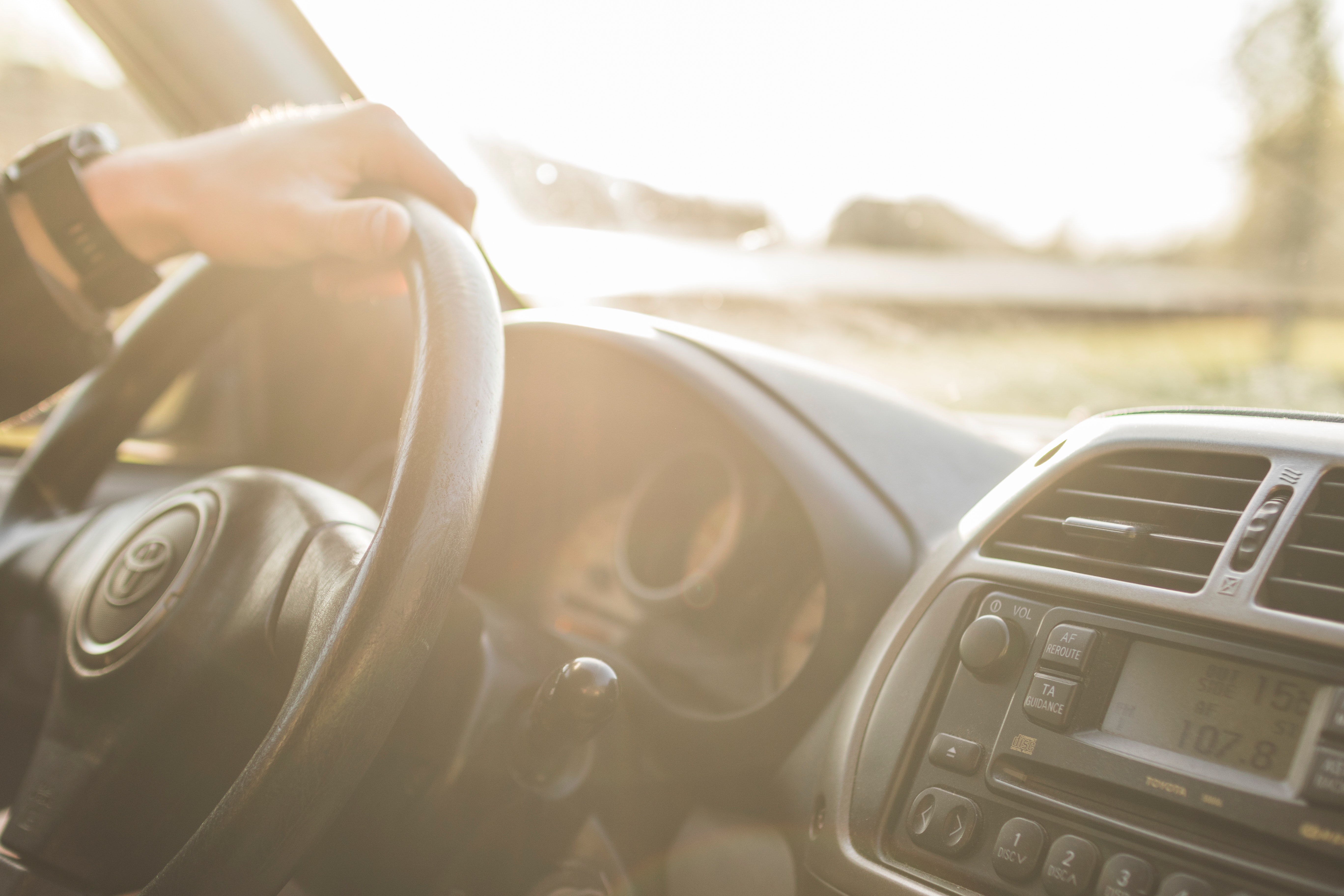If you’re arrested for a DUI/DWI, you may lose your driver’s license. In this article, we’ll cover what to expect following your arrest, including how long your license revocation will last. You’ll also learn how to fight your license revocation, as well as how to reinstate your driving privileges as quickly as possible.
We’re here to help you be armed with the knowledge you need to fight license revocations and all other consequences of a DWI conviction — so you can get your life back on track.
What to expect when you’re arrested for a DUI/DWI
Will I lose my license?
Yes. You will lose your driver’s license if you are convicted of a DWI or DUI in Minnesota. This includes commercial driver’s licenses (Class A, B, and C licenses). Even if this is your first DWI, your license will still be revoked.
When will my license be revoked after an arrest?
If you are arrested for a DWI and test above the legal limit, you will receive a notice of the revocation of your driving privileges immediately from the arresting officer. This revocation of your license is also called an “administrative action”.
Your license will be revoked immediately, but you will be given a temporary license that allows you to drive for 7 days before your revocation goes into effect. But this process of immediate license revocation following your test will happen before you have been convicted of a crime or even made your first court appearance. Because these revocations are administrative, the same rights that apply in criminal cases do not apply here.
If you refuse to test, will you lose your license?
Yes. If you refuse to take a breath, blood, or urine test that an officer is requesting from you to determine the presence of alcohol or drugs in your system, your license will also be revoked by the officer on behalf of the state. This revocation will also be by administrative action and can remain on your driving record even without a criminal conviction.
Here’s why: Minnesota law requires all drivers who are lawfully arrested for driving under the influence to take a chemical test when asked to do so by an officer or when ordered to do so by a judge via a search warrant. You can’t refuse the test without consequences because your consent is “implied” by your decision to drive in the first place — this is why these laws are known as “implied consent laws.”
Every state has implied consent laws that result in administrative actions against a person’s privilege to drive. Minnesota has taken that a step further by actually criminalizing a driver’s refusal to submit to a test.
In 2016, the U.S. Supreme Court and the Minnesota Supreme Court ruled that drivers may not be criminally punished for refusing to submit to a blood or urine test based on “implied consent” because of the intrusive nature of the testing.
In response, Minnesota passed a new law that requires police officers to obtain search warrants from judges for all blood and urine tests. So today, whether you refuse an officer’s request for a breath test under the implied consent law or refuse to cooperate with a blood or urine test pursuant to a search warrant, your license will be administratively revoked (typically for a longer period than a test failure) and you will be prosecuted for refusing (typically with a more serious charge than driving drunk).
It’s worth noting that police must have probable cause that you are intoxicated before they can seek a test from you. Probable cause can include driving recklessly or failing a field sobriety test. If you believe an officer did not have probable cause to require you to submit to testing, a defense attorney can help fight your license revocation on this and many other grounds.
What to expect after your license is revoked
How long will my license be revoked after a DUI/DWI?
The length of time your license will be revoked varies depending on your history of prior offenses and how high your BAC was at the time of testing (or if you refused to test).

License revocation vs. license cancellation
A third offense or more during a 10-year window (or a fourth offense in a lifetime) will also lead to a “cancellation” of your license. Cancellation is different from a revocation in that you must enroll in an alcohol treatment program in order to even begin your revocation/cancellation period. You are also required to get an ignition interlock device installed in your car. This is a device that requires the driver to pass a breath test before starting the vehicle and at random intervals while driving.
How to prevent your license from being revoked
How can I prevent my license from being revoked?
Appealing your administrative revocation
You have the right to appeal your license revocation. That appeal takes the form of a civil lawsuit against the Minnesota Department of Public Safety. The appeal must be filed within 60 days of receiving the Notice of Revocation or it is waived. Your license will remain under revocation while the appeal is pending, so it is important that the appeal be filed as soon as possible to protect your privilege to drive.
Filing a civil case against the state is not a simple matter, so it is important to hire an experienced defense attorney for the best chance at retaining your driving privileges.
A DWI attorney will handle both the civil and criminal penalties associated with your DWI case. The decision made at your civil license hearing does not impact the decision that will be made at your criminal trial. If an attorney is telling you they will only handle the criminal part of your case, walk away. In Minnesota, having either a DWI criminal conviction or civil license revocation counts exactly the same. You have to fight and win twice to prevail. If a lawyer is telling you he or she will only handle part of your case, they are telling you they will not defend you from the real consequences of a DWI. Find a lawyer who will.
At your administrative hearing, the court will consider whether the revocation of your driving privileges was appropriate — it does not establish whether you are guilty of the crime of DWI.
Avoiding a conviction
Even if you win your license revocation appeal, the state can still try to convict you of the criminal DWI charge. And if they are successful, your license will end up revoked again for the conviction. Hiring an experienced defense attorney is the only real way to fight against a DWI conviction, which is also necessary to prevent your license from being revoked. Resolving your case for a non-DWI charge or being found not guilty of DWI is the only way to avoid the criminal revocation.
How to get your license back as soon as possible after a DUI/DWI arrest
How can I get my driving privileges back earlier?
Work permits and limited licenses
Work permits, also known as limited licenses, allow you to retain some of your driving privileges even if your license has been revoked. You can be issued a limited license to drive to work, school, substance abuse meetings, doctor’s appointments, to provide for your family’s medical needs, and other important situations.
Limited licenses do not permit a person to drive themselves or their kids for discretionary reasons, such as school or sporting events, and can only be used for work up to 60 hours per week. For that reason, many drivers elect to go on the ignition interlock program.
Ignition interlock devices
Minnesota’s ignition interlock program also enables drivers who have had their license revoked for a DWI to remain mobile. This is a device wired into a car’s ignition that requires a driver to pass a breath test before the vehicle will start. The device will also require the driver to provide breath samples at random intervals while driving. If a person with greater than 0.02 alcohol on their breath attempts to start their car, the device will “lock out” the driver and not start. That test failure will also be reported to the Department of Public Safety and may extend the time the driver remains subject to the interlock restriction on their license.
These devices are not free and can be embarrassing, but they do allow a driver to continue driving for all purposes and at all times, including while their appeal of their license revocation is pending in court.
Take action to fight the consequences of a DWI
License revocations are just one consequence of being either charged with or convicted of a DWI. Don’t allow a DWI arrest to derail your life — hire an experienced defense attorney who will fight for your best interests.

